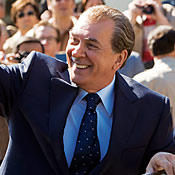- REVIEW
- READER REVIEWS
Frost/Nixon
|
(No longer in theaters)
|
|
Genre
Drama
Producer
Brian Grazer, Ron Howard, Tim Bevan, Eric Fellner
Distributor
Universal Pictures
Release Date
Dec 12, 2008
Release Notes
Limited
Official Website
Review
Somewhere�perhaps in the netherworld, rats gnawing on his kidneys, awaiting the arrival of his friend Henry�Richard Nixon is smiling at the thought of being played by the grave, sonorous, still-handsome Frank Langella. For all his attempted gravitas, Nixon was a shifty-eyed lightweight and transparent phony, whereas Langella is a born Shakespearean. Finally, Nixon has the stature that eluded him in life!
In the film of his play Frost/Nixon, Peter Morgan elevates the 1977 interviews Nixon gave (or, rather, sold, for an unheard-of $600,000) to English TV personality David Frost into a momentous event in the history of politics and media. His conceit is to frame the whole spectacle as a championship boxing match with coaches in each man’s corner (Kevin Bacon as Nixon man Jack Brennan, Sam Rockwell and Oliver Platt as Team Frost’s James Reston Jr. and Bob Zelnick). Frost and Nixon have one huge thing in common: They each need a showbiz comeback. But Nixon’s object is to redeem himself (or, failing that, run out the clock), Frost’s is to get Nixon to admit that he was what he’d assured the American people he wasn’t (and would never, thanks to Gerald Ford, be convicted of being): a crook. There’s also a Rocky element: Will the playboy and gadabout Frost (played by Michael Sheen) cram for the final interview on Watergate and score a knockout, or will he let Nixon continue to talk circles around him and win on points?
In the theater, Frost/Nixon had the trappings of a Big Deal: Langella’s reverberant presence, a sardonic narrator in Reston, and a bank of monitors that created a tension between the live performance and its video translation. The film, directed rather impersonally by Ron Howard, is brisk, well crafted, and enjoyable enough, but the characters seem thinner (Sheen is all frozen smiles and squirms) and the outcome less consequential. As in Morgan’s screenplays for The Queen and Longford, the theme is the collision of venerable authority figures and a modern media that (in their view) cheapens and distorts everything that they stand for. Does the camera trivialize�or does it pick up truths the human eye rarely sees as starkly? Did it caricature Nixon, who loathed it, or penetrate to his crooked soul? Resonant questions�but at this point, why should we care that Frost salvaged a minor TV career by getting the guilty-as-sin Nixon to acknowledge, after hours of prodding for which he was exorbitantly compensated, that he �let the American people down�? In terms of its impact on the electorate (and the relations between politicians and the media), the Nixon-Frost interviews have been dwarfed by the meeting of Katie Couric and Sarah Palin, in which the interview subject was so surreally deficient that routine follow-ups became �gotcha� questions. Even Nixon would have been appalled.
Frost/Nixon is unsatisfying even if, like me, you’re a lifelong aficionado of Nixon-bashing. Morgan makes him out to be a Great White Whale, but when he sat down with Frost, Nixon was already dead in the water�convicted by his own words in White House transcripts to the point where even his Republican allies had long deserted him. And with selective editing, Morgan makes it seem as if Frost got Nixon to admit more than he actually did. The original Watergate interview is now on DVD, and there are self-exculpatory escape clauses in every interminable, circumlocutory utterance. When Frost read aloud from the White House transcripts, Nixon’s eyes darted around as he searched his brain for linguistic loopholes. In Frost/Nixon, Langella’s heavy features move slowly; he seems to be plumbing the depths of his soul and glimpsing, for an instant, the abyss. Alas, the shit that dribbles from Langella’s mouth is still Tricky Dick’s.
